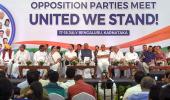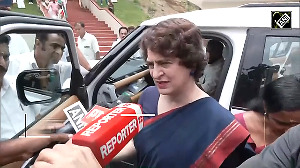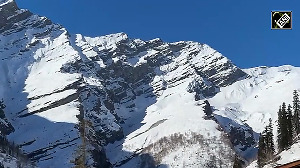'Most leaders, from Lalu Yadav and Mamata to M K Stalin, respect and trust Sonia. She should continue unless she expressly declines.'

Swift backchannel communications among the strategists of the 26-party Opposition bloc succeeded in untangling the brinkmanship knots of some of its leaders, thereby staying on an even keel within the Indian National Developmental Inclusive Alliance (INDIA) alliance .
As INDIA constituents gather in Mumbai for the third summit on Thursday and Friday, several trends have emerged since their inaugural meeting in Patna two months ago.
The Trinamool Congress represents the voice of the critical smaller parties in the alliance, including the Samajwadi Party, the Aam Aadmi Party, the Shiv Sena, and the Janata Dal-United.
Even older Congress allies, like the Jharkhand Mukti Morcha, are turning to the TMC.
Smaller parties have appreciated West Bengal Chief Minister Mamata Banerjee drawing the line, asserting that the largest party in any state should make decisions regarding alliances.
For instance, the JMM is unwilling to accept the Congress as its senior partner in Jharkhand, as was the case in the 2019 Lok Sabha elections.
Backroom strategists from the Congress and TMC intervened to iron out three recent rough spots.
At least two TMC MPs reached out to Supriya Sule of the Nationalist Congress Party after her father Sharad Pawar met his nephew, Maharashtra Deputy Chief Minister Ajit Pawar.
This meeting raised questions among Maha Vikas Aghadi constituents about the senior Pawar's political allegiance.
Sule reassured them that her father would remain loyal to the alliance until his last day.
The Congress swiftly extinguished the flames of conflict between the Congress and AAP, with a senior Congress leader rejecting Alka Lamba's statement that her party was preparing to contest all seven of Delhi's Lok Sabha seats.
This statement had led AAP to threaten withdrawal from the alliance.
Additionally, in a third instance of successful backchannel diplomacy, Rashtriya Lok Dal chief Chaudhary Jayant Choudhury's absence from the Rajya Sabha during the vote for the Delhi Services Bill fuelled speculation about a potential alliance with the Bharatiya Janata Party.
Choudhury dispelled any notions of such an alliance last fortnight.
Moreover, while the Congress and TMC shape the fledgling INDIA, the Left parties find themselves marginalised, even though they have demonstrated political maturity by keeping their faith.
The proposal to establish the INDIA Secretariat at the Communist Party of India-Marxist)-owned H K S Surjeet Bhavan in Central Delhi is likely to be rejected by the TMC.
Interestingly, the Left continues to ally with the Bharat Rashtra Samithi in Telangana, a party opposing the Congress in the coming state elections.
In Kerala and Bengal, the Left remains a rival to the Congress and TMC, respectively.
However, it is a constituent of the ruling INDIA parties' alliances in Bihar and Tamil Nadu.

Furthermore, non-Congress parties have found solace in dealing with the accessible Congress President Mallikarjun Kharge.
If Sonia Gandhi, the chairperson of the erstwhile United Progressive Alliance, were to decline her position, they might propose Kharge as the chairperson of the alliance.
The camaraderie between Mamata and Rahul Gandhi was a highlight of the alliance's summit in Bengaluru on July 18.
However, the forthcoming challenge for the alliance during its two-day meeting on August 31 in Mumbai would be determining the salience that leaders like Bihar Chief Minister Nitish Kumar and his Delhi counterpart Arvind Kejriwal believe they deserve.
While Nitish sees himself as the 'architect' of the alliance, AAP now holds the status of a 'national party' and seeks a more central role.
Sources within the bloc indicate that the Mumbai meeting will tackle some of these issues.
The alliance will establish a coordination committee to facilitate swifter and less public communication for resolving differences.
Additionally, four independent committees will examine the alliance's agenda, seat-sharing, and social media synergy.
However, some believe that discussing a common minimum programme and seat-sharing at this stage is premature.
A choice for a chairperson must also be made.
"Most leaders, from Lalu Yadav and Mamata to M K Stalin, respect and trust Sonia. She should continue unless she expressly declines," states a strategist.
Nitish could serve as the alliance's convener, although there is mention of Congress General Secretary Jairam Ramesh, who brings his experience from the 2003-2004 UPA formation.
"The alliance requires an 'honest broker', and Nitish might fit that role, contingent on the direction favoured by the Bengal CM," observes a Congress strategist.
In terms of seat-sharing, the bloc maintains effective alliances in Tamil Nadu, including Puducherry, Maharashtra and Bihar, accounting for 128 seats.
The allocation of the 20 seats in Delhi and Punjab between the Congress and AAP presents a challenge.
Meanwhile, the Congress must decide on allies and confront the BJP across the Hindi heartland and Gujarat.
However, it treads cautiously in launching joint protests against inflation lest such actions singe state governments its constituents run.
Feature Presentation: Aslam Hunani/Rediff.com












 © 2025
© 2025